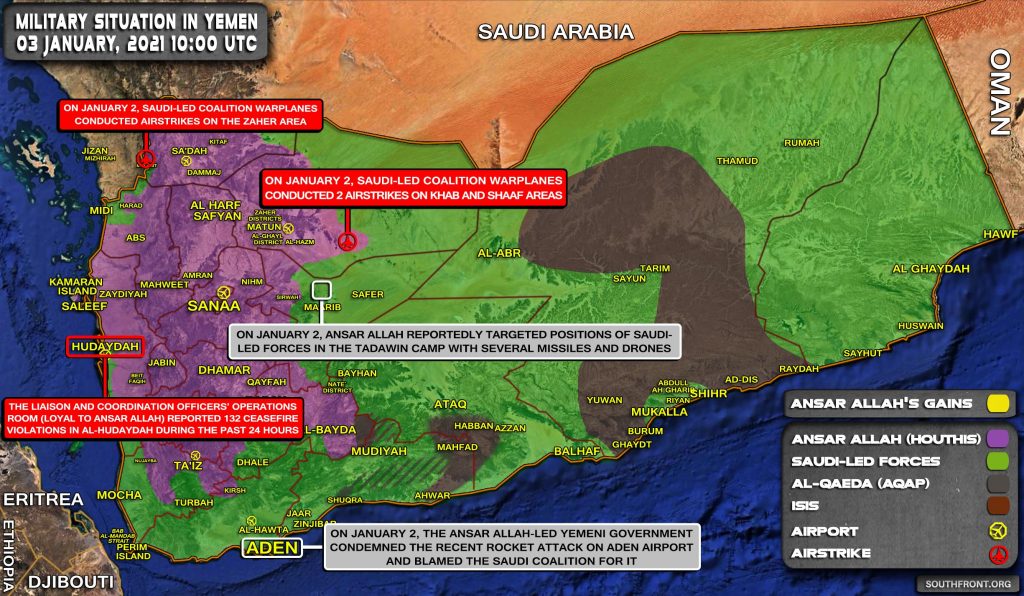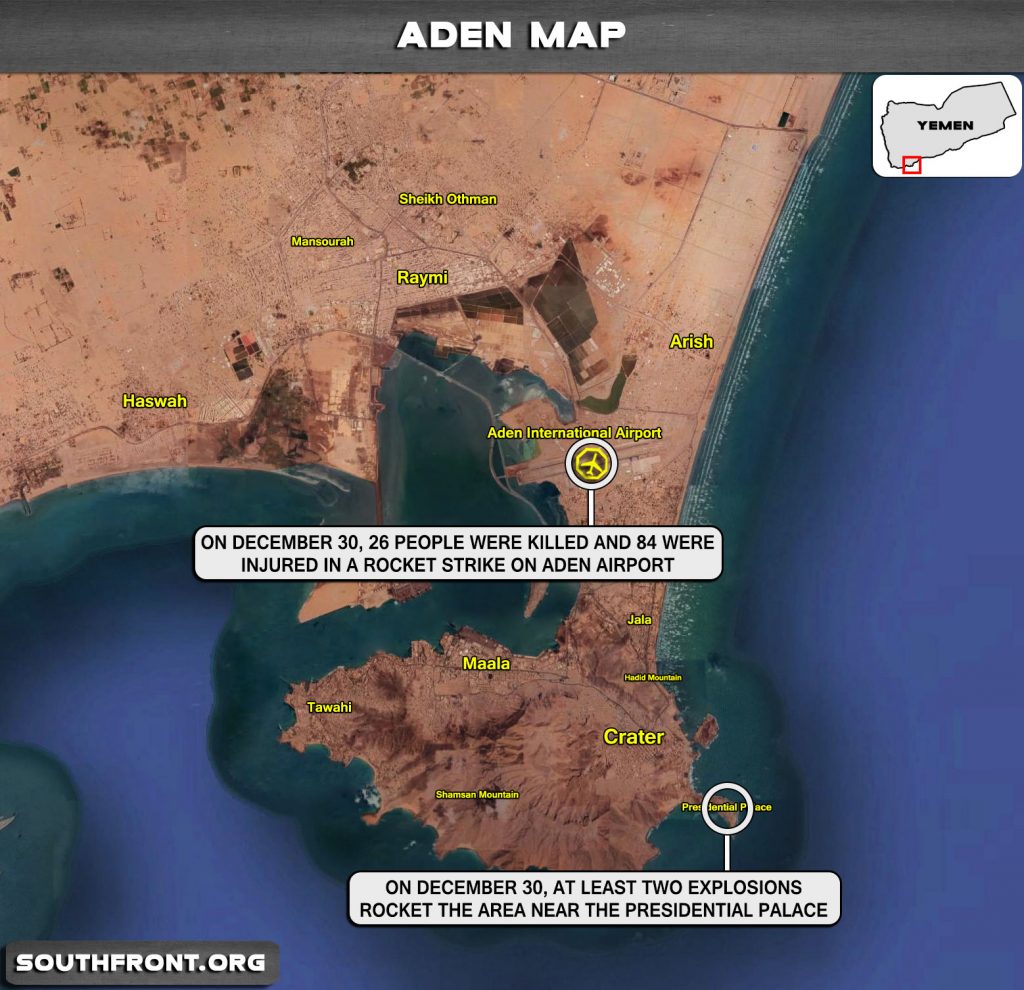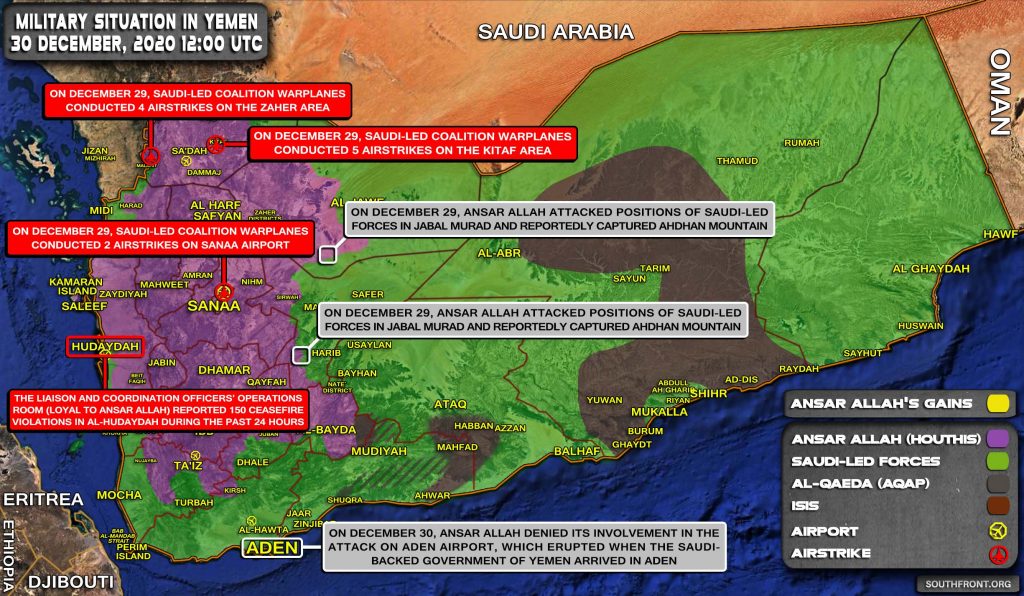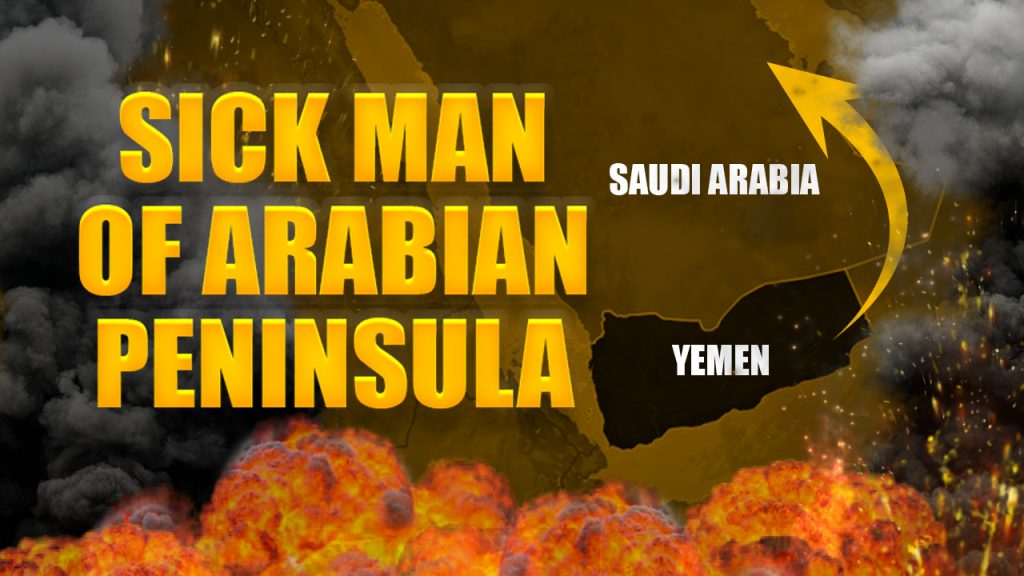A brief overview of the recent developments in Yemen:
- On January 2, Ansar Allah reportedly targeted positions of Saudi-led forces in the Tadawin camp with several missiles and drones;
- On January 2, the Ansar Allah-led Yemeni Government condemned the recent rocket attack on Aden Airport and blamed the Saudi coalition for it;
- The Liaison and Coordination Officers’ Operations Room (loyal to Ansar Allah) reported 132 ceasefire violations in al-Hudaydah during the past 24 hours;
- On January 2, Saudi-led coalition warplanes conducted 2 airstrikes on Khab and Shaaf areas;
- On January 2, Saudi-led coalition warplanes conducted airstrikes on the Zaher area.
All Eyes On Aden, As Saudi Arabia Shows Inability To Protect Its Yemeni Puppet Government (source):
On December 30th, a large explosion struck the airport in the southern Yemeni port city of Aden.
This became a sort of “greeting ceremony” for the arrival of the new “unity government” that arrived to purportedly lead the country.
Yemen’s Interior Ministry said least 26 people were killed and more than 50 were wounded in the blast.
Yemen’s President Abd-Rabbu Mansour Hadi has sworn in a new government that was formed thanks to a power-sharing deal brokered by Saudi Arabia.
There is no doubt whatsoever that the government is entirely a Saudi puppet one.
The new government, headed by Prime Minister Maeen Abdul Malik, represents Yemen’s northern and southern areas with equal numbers of members from each region.
The formation of the government was part of the Saudi Arabia-backed Riyadh Agreement, signed between the Yemeni government and the Southern Transitional Council (STC) in November 2019 to seek an end to military clashes between forces of both parties.
The Houthis were not part of the agreement and the fight against them continues.
Regardless, the source of the explosion was not immediately clear and no group claimed responsibility for attacking the airport. No one on the government plane was hurt.
Hours after the attack, a second explosion was heard around Aden’s Maasheq presidential palace where the cabinet members including Prime Minister Maeen Abdulmalik, as well as the Saudi ambassador to Yemen, had been taken to safely, residents and local media said.
It was unclear what caused the second blast and there were no immediate reports of casualties.
Abdulmalik condemned the airport attacj as “treacherous” and “cowardly”.
“This treacherous, cowardly and terrorist attack, places the government at the heart of its responsibilities, which is the task of ending the coup, restoring the state, spreading stability and the recovery of our country,” Abdulmalik said.
An AFP correspondent at the airport said he heard two explosions. “At least two explosions were heard as the cabinet members were leaving the aircraft,” the correspondent said.
As the easiest accusation, Yemen’s Information Minister Moammar Al-Eryani blamed the attack on the Iran-backed Houthi rebels, adding that all the members of the government were safe.
“We assure our great people that members of the government are fine, and we assure you that the cowardly terrorist attack by the Iran-supported Huthi militia will not deter us from carrying out our patriotic duty,” he said on Twitter.
Yemeni Prime Minister Maeen Abdulmalik Saeed, who was on the plane, tweeted that he had survived the attack and was safe.
“The cowardly terrorist act that targeted Aden airport is part of the war being waged against the Yemeni state and our great people,” the tweet read, “and it will only increase our insistence on fulfilling our duties until the coup is ended and the state restored and stability, mercy for the martyrs and healing for the wounded.”
Riyadh, for its part, has condemned the airport attack.
“The targeting of the Yemeni government upon its arrival at Aden airport is a cowardly terrorist act targeting all the Yemeni people, their security, stability and their daily life, ” Saudi ambassador to Yemen Mohammed al-Jabir tweeted,” and confirms the extent of disappointment and confusion that the makers of death and destruction have reached as a result of the success of the implementation of the Riyadh Agreement and the formation of the Yemeni government and its initiation to start its tasks to serve the Yemeni people.”
The UAE Foreign Ministry issued a similar statement, saying Abu Dhabi “strongly condemned” what it called a “cowardly terrorist attack” and a “sinister project” meant to destabilize the country.
“The Ministry stressed that the continuation of these attacks illustrates the nature of the danger facing the region from the Houthi coup, and the efforts of these militias to undermine security and stability in the region,” the statement said, ” stressing that the Arab coalition led by the Kingdom of Saudi Arabia continues to support and support everything that achieves the interest of the brotherly Yemeni people and contributes to its stability and its security.”
State Department spokesperson Cale Brown said the U.S. too “strongly condemns” the Aden attacks. The US, however, didn’t blame the Houthis or anybody else for the attack.
He noted that the timing and apparent target of the attacks “once again demonstrate the malicious intent of those trying to destabilize Yemen.”
“Such attacks will not stop or undermine efforts to bring a lasting peace that the Yemeni people deserve,” he added. “These violent acts must end, and the perpetrators must be brought to justice. The United States supports the legitimate government of Yemen and stands with the people of Yemen as they work towards a better future for all Yemenis.”
The Houthis, however, categorically denied responsibility for the attack in the Saudi-proclaimed capital of Yemen.
The real capital of Yemen – Sana’a is under Houthi control.
Abdulelah Hajar, a veteran Yemeni diplomat who serves now as adviser to the presidency of the Houthi-led Supreme Political Council, offered his condolences for the victims and issued a thinly-veiled allegation against Saudi Arabia.
“It does not require intelligence or analysis to know that whoever undertook the criminal terrorist act by bombing Aden airport is the same one who undertook the aggression against Yemen six years ago and killed and wounded hundreds of thousands of innocent Yemenis by airstrikes and imposed siege by land, air and sea,” Hajar wrote on Facebook.
Supreme Political Council member Mohammed al-Bukhaiti also put the blame on Saudi Arabia and its ongoing dispute with the Southern Transitional Council, a group backed by the UAE, which attempted to capture Aden, and more regions in Yemen throughout 2020, after the power-sharing deal had been signed.
Others in Yemen’s pro-Houthi leadership blamed the UAE-supported faction, which violently split with the government of exiled Yemeni President Abed Rabbo Mansour in August of last year.
“In fact, the conflict in Aden and in the various Yemeni governorates occupied by the coalition of aggression against Yemen has been raging for a long time, and it is not only a political conflict, but rather a military conflict and a large-scale war, and the Riyadh Agreement came as an imposition from Saudi Arabia on the parties, especially those that follow the UAE,” Nasreddin Amer, Deputy Secretary of the pro-Houthi Information for the Center said.
Amer, who also serves as head of the Ansar Allah Media Center, said the Southern Transitional Council likely lashed out of frustration over the agreement’s terms.
“They have no desire for the implementation of this agreement and, as a result of their fear of Saudi pressure, they turned to using another method of conflict,” Amer said. “This other method is what happened today in Aden, as the fire came out from under the ashes into the open, and the government they wanted to be a solution turned into a problem and a crisis.”
It is most likely that the Houthis did not carry out the attack, but it was another faction, and potentially the Southern Transitional Council who want to have more influence over Yemen.
As such, the incident itself is showing of how weak Saudi Arabia’s control is over the entire situation, and it is evidenced by how poorly it is doing in clashes against the Houthis.
The Saudi-chosen and protected capital of Yemen was subject to attacks, which killed civilians, and incidents such as these are not exactly uncommon. After all, it should be reminded that earlier in 2020 the STC captured Aden and there had to be negotiations for them to loosen their control over the city.
As of the end of 2020, the conflict in Yemen turned into the full disaster for the Saudi Kingdom and its allies. The Saudis not only failed to achieve a military victory in the conflict, but in fact appeared to be on the brink of losing it. The Saudi-led coalition collapsed and the only influential player formally allied to the Saudis that openly participates in the war in the UAE. At the same time, relations between Saudi Arabia and the UAE were also complicated. Both states pretend on the diplomatic and economic leadership on the Arabian peninsula as well as support different factions in Yemen. Until recently, the Saudi-backed Hadi government and the UAE-backed STC were in the state of open conflict. The formation of the new Aden-based government that arrived in Yemen from Saudi Arabia on December 30 was intended to contribute to at least some stability in the coalition-occupied part of the country. Nonetheless, it seems that far from everybody is interested in this.
Taking into account that the Houthis denied their responsibility, the attack may have been carried out by the STC or affiliated structures. The STC reasonably considers it a more military capable force than the Saudi-backed Hadi government and repeatedly demonstrated this already. Other suspects are ISIS and al-Qaeda that enjoy the freedom of actions in the state of chaos established in southern Yemen.
Another factor is the advance of the US-Israel policy in the Middle East. Public rapprochement of Arab monarchies and Israel strengthened the positions of Iran as the only country which not only declares itself as Palestine’s and Islamic world’s defender, but actually puts words into practice. Saudi Arabia’s leadership will particularly suffer in terms of loss of popularity among its own population, already damaged by the failed war in Yemen and intensifying confrontation with UAE, both of which are already using their neighbor’s weakness to lay a claim to leadership on the Arabian Peninsula.
In these conditions, the further setbacks in the Yemeni conflict not only undermines the regional positions of Saudi Arabia, but also instigates negative tendencies and political tensions within the Kingdom itself.










3northern
3unmerciful
1markets